八年级上英语第一单元第三课时
初中-英语-仁爱版-八年级上册-Unit1 Topic3 教案

优质资料---欢迎下载Unit 1 Topic 3 Section A 本课是为仁爱英语八年级上学期Unit 1 Topic 3 Section A 编写的教学。
这是第一单元第三课题的第一课时。
在复习了前两个话题——运动类话题的基础上,进一步围绕校运动会展开讨论和学习。
本课从学生实际出发,对教材进行了必要的调整。
为了在45分钟内更好更有效地实现教学目标,设计了直观生动的教学,把教学顺序安排为:一、引——通过两个人的对话,引出本课的谈论话题校运会,学习本课的新词组。
二、学——①通过图片,学习校运会中出现的比赛项目。
②听录音1a,回答问题。
初步了解对话内容。
③观看视频1a,跟读课文,掌握对话内容,根据对话内容填空。
三、探——①知识点讲解。
②根据提示,复述对话内容,让学生加深对课文的记忆。
③阅读采访的内容,根据内容,选择合适的图片。
四、点—— ①听录音3-A ,选择正确答案,训练学生对参加校运会的表达。
②听录音3-B ,完成文章填空。
五、练—— ①假设你是记者,采访一位参加校运会的同学将采访编写成对话形式,并进行对话表演。
②4人小组讨论运动会所要参加的项目,完成表格,并请一个同学来做总结。
六、结 —— 总结本课重点语言点:学习了用 will 来表达一般将来时和谈论运动会。
sentencesvocabularygrammar1.Which sport will you takepart in?2.The boys ’800-meter race.3.I hope so.U3T3SA Future Tense with will/shallexcitingrelay race take part in,be good atU1SAHomework:1.仿照1a,与同学讨论在校运会中你将参加哪个项目?并把这个对话写在作业本上2.完成练习册Section A。
3.背诵1a。
Unit 1 Topic 3 Section B 本课是为仁爱英语八年级上学期Unit 1 Topic 3 Section B 编写的教学内容。
人教版新目标八年级英语(上)unit1第三课时教案

9. Don’t worry. There’s ______ wrong with your ears.
10. There’s __________ in the box. It’s empty.
11. Maybe ______ ____ put my pencil _________. I can’t find it ___________.
2.用法:
(1)合成不定代词在句中可以作主语,宾语或表语等。
Nobody will listen to him.
He wants somet hing to e at.
(2)不定代词作主语时,谓语动词要用单数。
There is nothing wrong with the TV.
Everybody likes to be free.
7. buy something special __________ 8写日记__________
9.大部分的猪_______________________
10.去度假____________________
二)、一般过去时态检测
Dear bill,
How was your vacation? Did you do _________ interesting? Did ________ in the family go with you? I went to a friend’s farm in the countryside with my family. _________was great. We fed some hens and saw some baby pigs. They were so cute! The only problem was that there was ______ much to do in the evening but read. Still ___________ seemed to be bored. Byefor now! Mark
仁爱版英语八年级上册Unit1Topic3TheschoolsportsmeetiscomingaS

(最新版)Unit1Topic3 SectionA参考教案Ⅰ. Material analysisSection A and Section B 的内容整合,用三个课时上完。
本节课为单元第一课和第二课时,用两课时上完。
主要活动为Section A 的1a和2b。
Section A 对话里,Yu Ting和Li Ming兴奋地谈论即将到来的运动会,呈现了本课所要学的语法重点Future Tense with will。
Yu Ting 和Li Ming 饶有兴趣地围绕Which sport will you take part in? 谈论着各自参加的运动会项目,呈现了重点短语:the boys’ 800-meter race, be in the long jump等。
本对话呈现了孩子们积极上进的学习生活,要求学生在学会课本语言知识的同时,向Yu Ting 和Li Ming学习,积极参与学校各项集体活动,在培养集体主义思想的同时,培养自己自信、上进的个人素质。
Ⅱ. Teaching aimsKnowledge aims:1. 能正确运用以下短语进行书面表达:the boys’ 800-meter race, be in the long jump, have lots of fun, prepare for,make many fiends, make friends with sb.等。
2. 能正确地理解下列句子和短语:The school sports meet is coming.the coming school sports meet3. 能正确理解并运用will将来时,能运用will进行造句。
Skill aims:1. 能听懂有关运动会项目的名称及相关话题。
2. 能熟练地运用will引导的将来时谈论有关运动会的话题。
3. 能正确朗读介绍运动会项目的对话或文章。
4. 能用will将来时介绍自己或朋友在运动会中参加的项目。
英语:Unit-1-《Me-and-My-Class》Lesson-3课件(1)(冀教版八年级上)
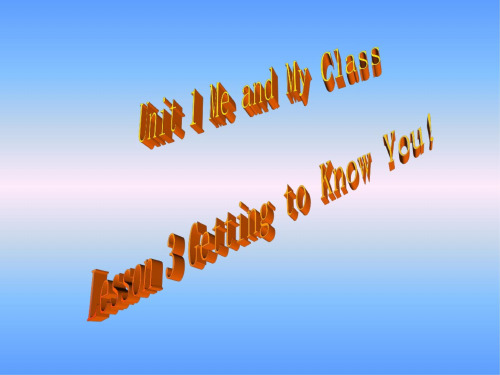
我没有摘花,也没采果,但收获颇多,什么也不用带走。喝了半辈子湘江水,到源头说声谢谢,是我来这里该做的事。世上只有两种事物可以对抗时间,一是水,二是善。善和水源一样,起初很弱 小,但聚积后可以成为一条湘江。每个人都是善的源头。有人排放污水、采石挖山、拦河筑坝,致使湘江伤痕累累。我为水源哭泣。别让人的阴影玷污了湘江。让水安静地发育,让大自然回到大自然。 湘江流淌,人要善良。水只想变成更远的水,人生比河流短一点,善却可以比河流更长。虽然遭受污染,但没有一棵树从地里拔腿就走,排队移民。所有的树,都在叶子和身上文身,文出小溪和河流的 图案,表示它们的热爱和决心。
人教版八年级上册英语课件第一单元第三课时

4.And because of the bad weather,we couldn’t
see anything below.
because of“因为”是介词短语,后接名词/代词/动名词。 而because为从属连词,引导表示原因的状语从句,还可 用来回答why引导的特殊疑问句。 I didn’t go out because of the rain.因为下雨,所以我没 有出去。 —Why was he late for the meeting?为什么他开会迟 到了? —Because he missed the early bus.因为他没赶上早班 车。
Read Jane’s diary entries about her vacation and answer the questions. (1)Did Jane have a good time on Monday?
Yes,she did.
(2)What about on Tuesday?
She didn’t have a good time on Tuesday.
The main idea of this passage is about
C
.
A.places of interest in Malaysia
B.how to keep a diary
C.Jane’s diary entries about her vacation
☆教材解读☆
1.I felt like I was a bird. feel like给……的感觉;感受到。 She felt like an interloper in her own family.她感到在 自己家里自己像个外人。 【辨析】 feel like,look like (1)feel like“给……的感觉,摸起来像,像是”。 I felt like a new man myself.我感觉像换了一个人。 The cloth feels like silk.这布料摸起来像丝绸。
八年级英语上册Unit 1 第3课时(教案)
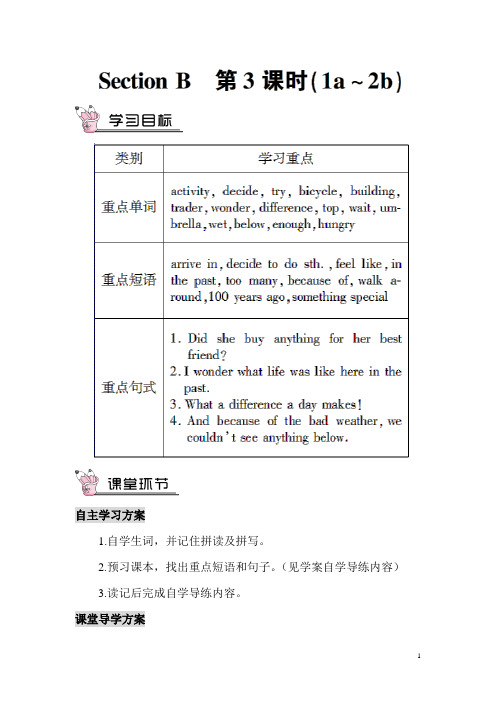
自主学习方案1.自学生词,并记住拼读及拼写。
2.预习课本,找出重点短语和句子。
(见学案自学导练内容)3.读记后完成自学导练内容。
课堂导学方案Step 1 复习(2分钟)1.检查家庭作业。
2.请两个学生把上节课调查的结果做报告。
Step 2 情景导入(2分钟)教师通过师生自由交流,导入本节课的话题。
1. How was your vacation? (exciting, boring)2. How was the food? (delicious, terrible)3. How was the souvenir? (expensive, cheap)根据形容词的描述,导出听力。
环节说明:以假期为话题,导入新课,过渡自然,引起学生的表达欲望。
Step 3 完成教材1a—1e的任务1.仔细观察1a图片,将图片和形容词匹配,集体核对答案。
(2分钟)2.再认真地读1a中的单词,然后将这些单词分成两类,将表示积极意义的形容词写在左边的横线上,将表示消极意义的形容词写在右边的横线上,小组内核对答案,完成1b。
(2分钟)3.让学生用这些形容词来写句子,写完后小组内互相交流。
(3分钟4.学生听1c的录音,回答问题。
(2分钟)5.让学生再听一遍,完成1d的填空任务。
(2分钟)6.核对答案。
(单独提问与集体回答相结合)。
(1分钟)7.跟读录音,纠正语音语调。
(1分钟)8.教师让学生根据1c中提供的信息谈论Lisa的假期。
(可用where, what, how等问题来谈论)。
(4分钟)9.小结训练。
(2分钟)( A )(1)Where did Kim _________vacation?A. go onB. go inC. go toD. went on( A )(2)Jim is a boy _________brown hair.A. withB. ofC. hasD. in( D )(3)Yesterday we _________kites.A. flyingB. is flyingC. fliedD. flew环节说明:听、说、读、写结合起来,训练了学生的综合能力,小结训练对所学语言起到了巩固作用。
八年级英语上Unit1 第三课时

路疃初中八年级英语电子备课组使用人:2015年9月The Third Period (Section B1a-1e)主备: 审查:使用:Teaching Aims and Demands:1、Knowledge Object:(1)Master the key words:delicious,expensive,exciting, cheap,terrible,boring(2)Master the sentence structures:Where did…?What did…?Did she…?How was…?How were…?2、Ability Object:Encourage students to enjoy their holiday and life.Teaching Key Points:1.Master the key vocabulary and sentence structures.2.Master the past tense in special questions.Teaching Difficult Points:How to talk about past vacation using the simple past tense.Teaching Methods:Listening and speaking practice.Teaching Aids:PPT, A tape recorder.Teaching Procedure:Step1 Warm-upAsk some students to talk about their vacations.For example:S:1 went to…1ast vacatio n. It was great.The weather was fine.The people there were friendly and the food was delicious...Step2Presentation1.Lead-inUse the textbook.T:What do you think of this book? Is it interesting?Students may answer “Yes.it’s interestin g.”Some may answer“N0.it isn’t interesting.It’s borin g.”2.Teach Activities la&lb.Point to the ring in Picture a.T:This is a ring.The price is one hundred million dollars.What do you think of it?Ss:Wow.It’s too expensive.It’s not cheap.Point out the six words in la.T:Please read the words after me.Call attention to Picture f.Teach delicious and terrible.T:L et’s look at Picture f.What is this?Ss:It is a cake..T:Look at the person.What do you think of it?Ss:It’s delicious.T:Please look at the person in Picture b.What do you think of the food?Ss:It’s not delicious.Maybe it’s terrible.Call attention to Picture c and Picture d.Teach exciting and boring.T:This time,please look at Picture c and Picture d.What do you think of these twoboring.Point out the blank line in front of each numbered word.Ask students to match each word with a picture by writing the letter of each picture in the blank in front of the correct word in Activity l a.Check the answers.Answers:1.f 2.a 3.c 4.e 5.b 6.dPoint out the smiley face and the frowny face in l b.T:The smiley face is for good things.The frowny face is for bad things.Call attention to the six words in Activity la.Now write each word under the smiley face or under the frowny face in l b.Point out the sample answer.T:The word delicious is under the smiley face because delicious is a happy word.Ask students to finish the Activity individually.Then check the answers.Answers:Smiley face:delicious,cheap,excitingFrowny face:terrible,,expensive,boringStep3 PracticeListenin g.(Activities l c & l d)T:Lisa went on vacation last holiday.Now she is talking about her vacation.P1ease listen to this conversation and answer the questions in l c.Read the questions to the class.Play the recording the first time .Students only listen.Play the recording a second time.T:Listen to the recording and write the answer to each question.Check the answers.T:Listen to the recording again.This time,write down what Lisa thinks of these things in the blanks in the chart.Point out the sample answer.T:What did Lisa say about her vacation? It was great.Play the recording the first time.Students fill in the chart.Play the recording a second time.Ask students to finish filling in the blanks and to check their answers.Finally,check the answers by inviting some volunteers to present their answers.T:I'd like several students to say something about Lisa’s vacation.For example:Lisa went to Tokyo on vacation.She liked her vacation very much. It was great.The people there were friendly and the food was delicious.The museums were interesting but they were very crowded.The stores were expensive.Call attention to the question words.Have a| student read them to the class.T:Please make conversation in pairs.Student A,you are Lisa’s friend.Student B,you are Lisa.Student A,use these question words to ask Lisa questions about her vacation.Student B,you can use the information in Activities 2a and 2b to answer.For example:Where did you go on vacation?1 went to Tokyo on vacation. 1 As students talk,move around the room,offering pronunciation and language assistance as needed.|Ask several pairs to act their conversations out.Step 5 SummaryIn this period,we’ve consolidated the simple past tense.First,we learnt some adjectives by matching them with the correct pictures.Then we divided these adjectives into two groups.Next,we reviewed the simple past tense by doing listening practice.Finally,we consolidated the mastery of the simple past tense by making conversations to talk about Lisa’s vacation.Step6 Homework1.Review the key words and phrases.2.Write a conversation between Lisa and her friend to talk about Lisa’s vacation.3.Preview the passage in the next period.Blackboard Design:Unit 1Where did you go on vacation ?Period 3delicious cheap excitingterrible expensive boringWhere did…?How was…?How were…?Summary After Class:。
冀教版初中英语八年级上册 Unit 1 Me and My Class Lesson 3PPT课件

4. I play the violin.
play 后面跟“乐器”时要加冠词。 eg : play the violin (拉小提琴), play the guitar (弹 吉他) play后面跟“球类”时,不加冠词。 eg : play basketball (打篮球), play football (踢足球 )。
1. Let’s see… what’s my first question?
加拿大人习惯上用Let’s see来表达Let me see的意思。 Let’s see 较为常用。
2. I like donuts best.
like…best 意为“最喜欢……”, like…better意为“较喜欢……”, like…very much 意为“很喜欢……”, like…a little意为 “有点喜欢……”, don’t (doesn’t) like…at all 意为“根本不喜欢(一点儿也不喜欢)……”。
I’m singing?
A. a
B. an C. the D. 不填
Homework
Write a passage about what your new friend likes and hates to do.
Everything is good when new, but friends when old.
Practice
用适当的介词填空
1. Danny, Brian and Jenny have Miss Cox ____fo_r____ English class. 2. Usually everyone reads and writes ____in___ English class. 3. The English teacher wants me to talk _t_o_/_w__it_h__ my classmates. 4. I want you to write _to_/_a_b_o_u_t_ them. 5. I also like going ____fo_r_____ walks.
八年级上册第1单元第3课时教案
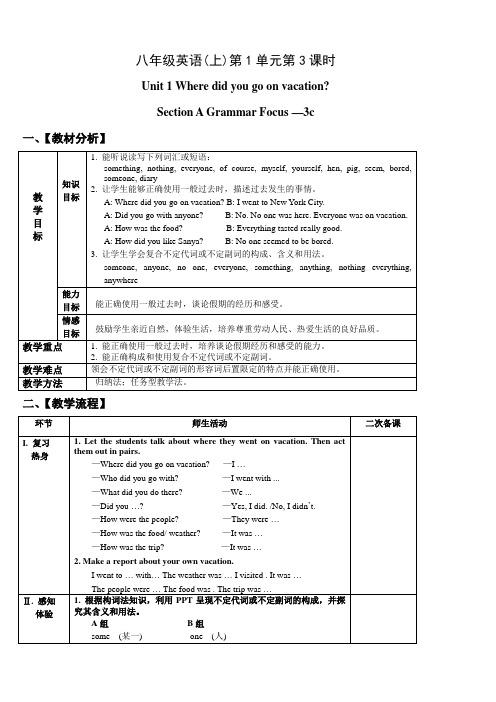
nothing和no one属于否定词,表示否定意义。
everything和everyone用于各种句型。
形容词修饰不定代词或不定副词时必须后置。
2. Activity 3a
(1) Fill in the blanks with the words in the box and then check theanswers.
Ⅱ.感知
体验
1.根据构词法知识,利用PPT呈现不定代词或不定副词的构成,并探究其含义和用法。
A组B组
some (某一) one (人)
any (任一) body(人)
no (无一) thing(事物)
every (每一) where(地点)
(1)不定代词或不定副词的构成和含义,四组共16个。
someone (某人)/somebody(某人)/ something(某事物) /somewhere(某处)
引导学生观察并归纳:
1含有one或body的是不定代词,表示“人”。
2含有thing的也是不定代词,表示“事或物”。
3含有where的是不定副词,表示“地点”。
4no与one搭配时是分离的,即no one。
(2)不定代词或不定副词的用法。
①含some的不定代词(副词)与some一样用于肯定句或委婉疑问句。
Answers: anything; everything; anyone; something; nothing; anything; anything
(2) Next practice the conversation in pairs.
(3) New words and expressions.
新人教版八年级上册英语 Unit1 第3课时 教案(教学设计)

Unit 1 Where did you go on vacation?Section B (1a-1e)单词delicious, exciting, terrible, expensive,1.学习更多表达情绪的形容词。
2.能听懂并会表达运用复合不定代词询问他人假期的对话。
3.能听懂并会表述自己或他人的假期生活。
能正确运用所学词汇及句型。
Step 1复习上节课所学内容,欣赏有关运动的视频,让学生谈观后感,导入新课。
①Review the indefinite pronouns.②Show a video about paragliding and ask some questions after watching it:Do you like the video?How do you feel about paragliding?Show the Chinese translation of 2d and ask Ss to say the English sentences.Step 2学习重点词汇,并通过分类对词汇加以巩固, 为听力部分打好词汇基础。
Work on 1aGet Ss to look at the pictures in 1a, and match the words with the pictures. Check the answers together.【Keys:1.f;2.a;3.c;4.e;5.b;6.d】Step 3听听力材料回答问题,培养学生在听的时候抓重点信息的能力;Work on 1cGet Ss to listen to the recording about Lisa’s vacation, and then answer the questions in 1c. Then check the answers.2.Work on 1d①Tell Ss this time they have to write down what Lisa said about her vacation, the people, the fun park, the food and the stores.②Then play the recording for the second time. Let Ss listen and write down the words.③Then play the recording for the third time for the Ss to check the answers.Step 4将听力练习与口语练习相结合,在听后对所学内容进行巩固输出。
仁爱版八年级英语上册 Unit 1 Topic 3 Section A 课件(共28张PPT)
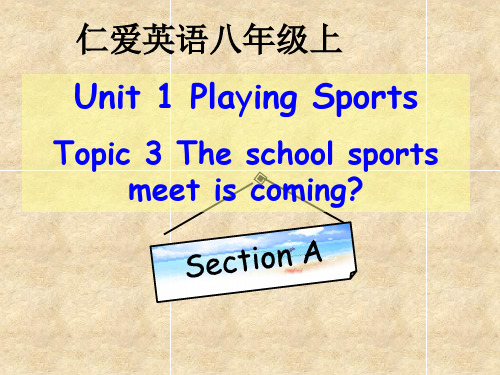
I believe
We learn ♥Expressions of taking part in sports meet:
join in,be in ,take part in、800-meter race ♥ The use of “will”.
TThhee lohnigghjujmumpp
cycling
swimming
basketball
football
running
the long jump the high jump
tennis
A:Which sport do you like best? B:I like… best. A:Why? B:Because …
Li Ming
school sports meet Yu Ting
1.校运动会__sc_h_o_o_l _s_po_r_t_s_m_eet 2.参加 t_a_k_e_p__a_r_t in = j_o_in__i_n_ = __b_e__i_n__
3.男子八百米赛 t_h_e__b_o_y_s’_8_0_0__-m__e_ter race
巧学妙记 一般将来时
一般将来时用法口诀:
一般将来时,将要发生事 谓语不一般,will加动原(动词原形) 要变疑问句,will提前面 否定句,也不难,will后面not添
中奖啦
2分
1
2
1分
1分
4
5
2分 3 3分 6
There will be our school sports meet next month.
人教版(新目标)英语八年级上Unit1教案第三课时 Section B (1a - 1e)
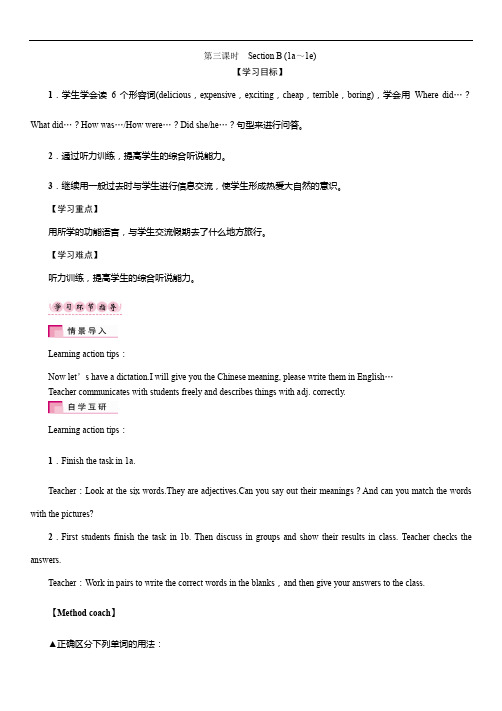
第三课时Section B (1a~1e)【学习目标】1.学生学会读6个形容词(delicious,expensive,exciting,cheap,terrible,boring),学会用Where did…?What did…?How was…/How were…?Did she/he…?句型来进行问答。
2.通过听力训练,提高学生的综合听说能力。
3.继续用一般过去时与学生进行信息交流,使学生形成热爱大自然的意识。
【学习重点】用所学的功能语言,与学生交流假期去了什么地方旅行。
【学习难点】听力训练,提高学生的综合听说能力。
Learning action tips:Now let’s have a dictation.I will give you the Chinese meaning, please write them in English…Teacher communicates with students freely and describes things with adj. correctly.Learning action tips:1.Finish the task in 1a.Teacher:Look at the six words.They are adjectives.Can you say out their meanings?And can you match the words with the pictures?2.First students finish the task in 1b. Then discuss in groups and show their results in class. Teacher checks the answers.Teacher:Work in pairs to write the correct words in the blanks,and then give your answers to the class.【Method coach】▲正确区分下列单词的用法:interest使感兴趣interested对……感兴趣interesting有趣的excite使兴奋excited感到兴奋exciting兴奋的我还知道relax,relaxed,relaxing情景导入生成问题1.T:一本有趣的书。
八年级英语上第1单元第3课时教案
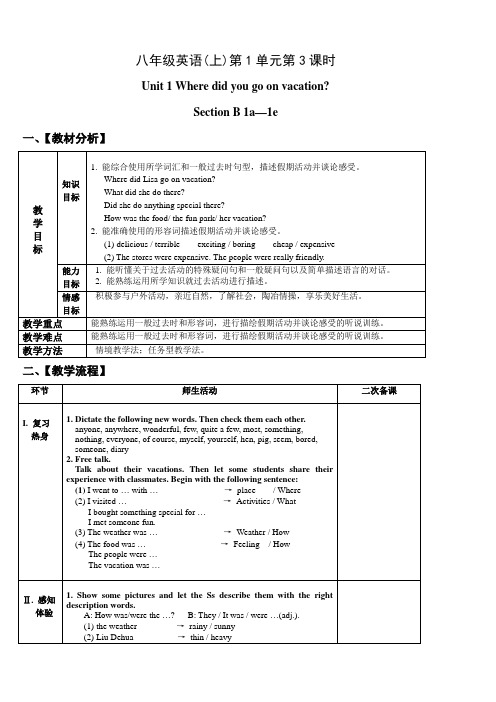
(5) Onions are healthy food, but they taste __________. So Most of kids don’t like them.
The people there were friendly. They had dinner at her father’s friends’
house. The food was delicious. She loved their home cooking. They had a
good time because everything was excellent.
(6) the rings→expensive/cheap
2.Match the words with the pictures below. (Activity 1a)
Answers: 1.f 2.a 3.c 4.e 5.b 6.d
3. Look at the words in 1a again. Write happy face words on the left
Where did…? What did…? Did she…?
How was…? How were…?
Ⅳ.实践
应用
1.First read the listen material in 1c1d and then write a passage about Lisa’s vacation. Ask a few Ss to show it to class. For example,
(2) The storeswereexpensive. The people were really friendly.
八年级英语上册课件:Unit 1 第三课时
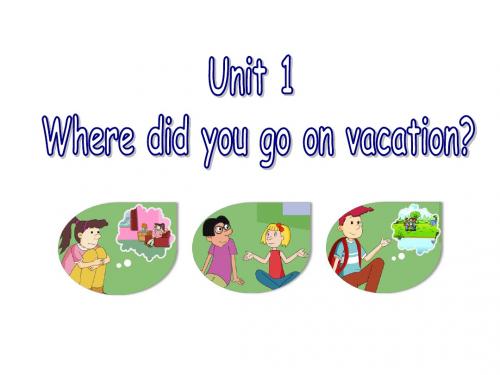
Linda: Why didn’t you buy _a_n_y_th_i_n_g_ for yourself?
Alice: I didn’t really see _a_n_y_t_h_in__g_ I like.
好像没有人知道太多这个老师
的事。
BACK
请同学们在 课后参照《 巴蜀英才•英 语》P4的内 容进行复习
。
bored adj.厌倦的;烦闷的
一般情况下,bored, interested,excited(兴奋的) 等ed形式的形容词多形容人, 意为“对……感到……的”;
boring,interesting, exciting等-ing形式的形容词 多形容物,意为“令人…… 的”。
hen n. 母鸡 pig n. 猪 seem v. 好像;似乎;看来
new words
Bored someone
diary
adj. 厌倦的;烦闷的 pron. 某人 n. 日记;记事薄
NEXT
请同学们在 课后参照《 巴蜀英才•英 语》P4的内 容进行复习
。
myself pron.我自己;我本人
happy today. 今天她似乎很高兴。
(2) seem to do sth.
He seems to know my name. 他似乎知道我的名字。
(3) It seems that + 从句.
It seems that no one knows much
about the teacher.
new words something pron. 某事;某物
nothing pron. 没有什么;没 有一件东西
八年级英语上册第一单元第3课时

学
过
程
四、当堂检测
A、用was, were填空。
1. Our teachers ________ not at school yesterday, they _________ at home, because it _________ weekend.
2.---_________your mother a nurse?
B、补全对话。
A: How ______ your vacation, Lin?
B: It ________ ________ good.
A: How _________ the beaches?
B: ________ ________ fantastic.
A: How _________ the __________?
Task2:预习1b,看图并用1a中的6个形容词作出评价。
Task3:listen and answer the questions。
Task4:listen again and fill in the blanks.
二、合作探究
请大家进行小组讨论,总结出你们听不懂的地方,并提出。
三、展疑解难
What did these people think of their vacations?
--- Terrible.
5. The weather __________ quite fine last Sunday.
6. I ________ a little girl ten years ago, and you _________ a little boy ten years ago.
B: It _________ hot and humid.
- 1、下载文档前请自行甄别文档内容的完整性,平台不提供额外的编辑、内容补充、找答案等附加服务。
- 2、"仅部分预览"的文档,不可在线预览部分如存在完整性等问题,可反馈申请退款(可完整预览的文档不适用该条件!)。
- 3、如文档侵犯您的权益,请联系客服反馈,我们会尽快为您处理(人工客服工作时间:9:00-18:30)。
Unit 1 How often do you do?
第三课时Teaching procedures :
Step 1 Leading in
1.Greetings & free talk .
2.Practise reading the article in Page
3.
3.Check the homework.
Step 2 Pre-task
SB Page4 , 1a .
1.Point out the five phrases .
2.Ss read after the teacher .
3.Make sure the Ss understand what do they mean .
4.Call attention to the pictures .Say something about the pictures .
5.Match the words with the pictures .
6.Check the answers .
7.Practice reading .
Step 3 While-task
Page 4 , 1b .
1.pay attention to the conversation in the box on the right .
2.Read it to the class .
3.Explain : “be good for”means :有益于…,对…有好处. Be good for ,Be good at与Be good to 的区别
be good at / be good with /
be good to / be good for
be good 后接不同的介词,表达的意思也不同。
1)be good at 意为“擅长……”,后接名词、代词或ving形式。
例如:
I’m good at playing chess.
我擅长下象棋。
2)be good with意为“灵巧的;与……相处得好”。
例如:
She is good with her hands.
她手很巧。
He is very good with the children.
他与这些孩子处得很好。
3)be good to意为“对……友好”。
例如:
My friend was good to me when I was ill.
我生病时我的朋友对我关怀备至。
4)be good for意为“对……有好处”。
例如:
Eating more vegetables is good for your health.
多吃蔬菜对你的健康有好处。
4.Pairwork. Choose a new partner .Use the words in Activity 1a to make conversations .
5.Share the students’ conversations.
Page 4 ,2a&2b .
1.T : Now you will hear a reporter interview two people ,Katrina & Bill .Read the two names for the Ss. In 2a ,we’ll know who is healthy , Bill or Katrina ?
2.Read the questions in 2a .
3.Listen to the tape carefully twice .Circle “yes” , “no” or “I don’t know” in the chart .
4.Before we check the answers in 2a,we’ll read through the questions in 2b .Pay
attention to Katrina’s and Bill’s answers .
5.Play the tape again .This time ,if we have heard one questions and we have a pause .Make sure Katrina’s and Bill’s answer.
6.From the answers in 2b ,we can tell who is healthy Bill or Katrina ?
Step 4 Post-task
Role-play .
Groupwork .Divide the Ss into groups of three .S1 is interview,S2 is Katrina ,S3 is Bill .
S1: How often do you exercise ?
S2: I exercise every day .
S3: … .
With the help of 2b .
Homework
1.Revise and copy the new words.
2.Make a suvery with the qudstions from 2b,write down the answers and compare. 教学后记。
